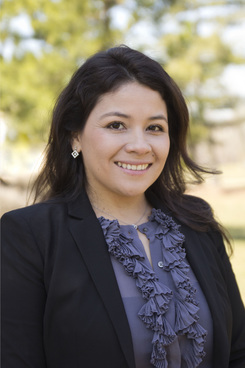Scarinci's Katerin Traugh on What Has 'Changed Forever' Because of COVID-19
"Attorneys and clients have now become accustomed to meetings by teleconference," says Katerin Traugh, executive director of Scarinci Hollenbeck. "While this was happening to some degree in the past, it was never entirely accepted by lawyers and clients. That has changed forever, and teleconferencing is here to stay."
July 20, 2020 at 10:00 AM
3 minute read
 Katerin Traugh, executive director of Scarinci Hollenbeck in Lyndhurst, New Jersey.
Katerin Traugh, executive director of Scarinci Hollenbeck in Lyndhurst, New Jersey.
Katerin Traugh earlier this month became the executive director of Scarinci Hollenbeck in Lyndhurst. Previously the controller at the firm and chief of staff to managing partner Donald Scarinci during the transition to remote work earlier this year, Traugh has been with the firm since 2017. Prior to that, she spend a decade in accounting and finance, the firm said.
"Katerin has the experience, the wisdom and the institutional knowledge of the firm to lead us through the COVID-19 crisis and take us to the next level when the world finally emerges from it," Scarinci said in a statement. "She has the right temperament and personality to inspire confidence and inject our at-home work force with the comfort of knowing that Scarinci Hollenbeck will not just survive, but that it will prosper during the difficult economic times ahead."
Traugh offered the below response to a question posed by the Law Journal about the ongoing changes in legal practice during the pandemic. The response was edited lightly for style.
What are the lasting operational advantages that will emerge from the COVID-19 pandemic, and what will be the lasting challenges?
The COVID-19 pandemic and the lockdown that resulted have changed the legal industry in many ways. First, attorneys and clients have now become accustomed to meetings by teleconference. While this was happening to some degree in the past, it was never entirely accepted by lawyers and clients. That has changed forever, and teleconferencing is here to stay.
The second most profound change to the legal industry is the realization that location does not matter as much as everyone thought. Attorneys can work from out-of-state locations and be just as productive as they are working from their law office. In some ways, attorneys can be more productive and efficient, and produce dollar savings for clients by not charging for travel time.
Third, as a result of the logistical issues that law firms have had to navigate around, and the massive personnel issues the new normal has created, there is much greater acceptance of the role of a qualified, non-lawyer executive director or CEO. The move toward professional management of law firms had been trending in the industry, but it's time has come. The midsize to large law firm of the future will most likely include professional management.
This content has been archived. It is available through our partners, LexisNexis® and Bloomberg Law.
To view this content, please continue to their sites.
Not a Lexis Subscriber?
Subscribe Now
Not a Bloomberg Law Subscriber?
Subscribe Now
NOT FOR REPRINT
© 2025 ALM Global, LLC, All Rights Reserved. Request academic re-use from www.copyright.com. All other uses, submit a request to [email protected]. For more information visit Asset & Logo Licensing.
You Might Like
View All
Was $1.3M in 'Incentive' Payments Commission? NJ Justices Weigh Arguments
3 minute read
Law Firms Look to Gen Z for AI Skills, as 'Data Becomes the Oil of Legal'

Trending Stories
- 1FTX One Year Later: The Impact on Examiner Practice in Bankruptcy Courts
- 2Gen AI Legal Contract Startup Ivo Announces $16 Million Series A Funding Round
- 3DOJ's Flawed Thinking in Challenging HPE-Juniper Merger
- 4Annual Self-Check: Testing For Bias On The Bench
- 5'None of Us Like It': How Expedited Summer Associate Recruiting Affects Law Students and the Firms Hiring Them
Who Got The Work
J. Brugh Lower of Gibbons has entered an appearance for industrial equipment supplier Devco Corporation in a pending trademark infringement lawsuit. The suit, accusing the defendant of selling knock-off Graco products, was filed Dec. 18 in New Jersey District Court by Rivkin Radler on behalf of Graco Inc. and Graco Minnesota. The case, assigned to U.S. District Judge Zahid N. Quraishi, is 3:24-cv-11294, Graco Inc. et al v. Devco Corporation.
Who Got The Work
Rebecca Maller-Stein and Kent A. Yalowitz of Arnold & Porter Kaye Scholer have entered their appearances for Hanaco Venture Capital and its executives, Lior Prosor and David Frankel, in a pending securities lawsuit. The action, filed on Dec. 24 in New York Southern District Court by Zell, Aron & Co. on behalf of Goldeneye Advisors, accuses the defendants of negligently and fraudulently managing the plaintiff's $1 million investment. The case, assigned to U.S. District Judge Vernon S. Broderick, is 1:24-cv-09918, Goldeneye Advisors, LLC v. Hanaco Venture Capital, Ltd. et al.
Who Got The Work
Attorneys from A&O Shearman has stepped in as defense counsel for Toronto-Dominion Bank and other defendants in a pending securities class action. The suit, filed Dec. 11 in New York Southern District Court by Bleichmar Fonti & Auld, accuses the defendants of concealing the bank's 'pervasive' deficiencies in regards to its compliance with the Bank Secrecy Act and the quality of its anti-money laundering controls. The case, assigned to U.S. District Judge Arun Subramanian, is 1:24-cv-09445, Gonzalez v. The Toronto-Dominion Bank et al.
Who Got The Work
Crown Castle International, a Pennsylvania company providing shared communications infrastructure, has turned to Luke D. Wolf of Gordon Rees Scully Mansukhani to fend off a pending breach-of-contract lawsuit. The court action, filed Nov. 25 in Michigan Eastern District Court by Hooper Hathaway PC on behalf of The Town Residences LLC, accuses Crown Castle of failing to transfer approximately $30,000 in utility payments from T-Mobile in breach of a roof-top lease and assignment agreement. The case, assigned to U.S. District Judge Susan K. Declercq, is 2:24-cv-13131, The Town Residences LLC v. T-Mobile US, Inc. et al.
Who Got The Work
Wilfred P. Coronato and Daniel M. Schwartz of McCarter & English have stepped in as defense counsel to Electrolux Home Products Inc. in a pending product liability lawsuit. The court action, filed Nov. 26 in New York Eastern District Court by Poulos Lopiccolo PC and Nagel Rice LLP on behalf of David Stern, alleges that the defendant's refrigerators’ drawers and shelving repeatedly break and fall apart within months after purchase. The case, assigned to U.S. District Judge Joan M. Azrack, is 2:24-cv-08204, Stern v. Electrolux Home Products, Inc.
Featured Firms
Law Offices of Gary Martin Hays & Associates, P.C.
(470) 294-1674
Law Offices of Mark E. Salomone
(857) 444-6468
Smith & Hassler
(713) 739-1250







